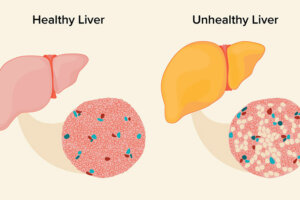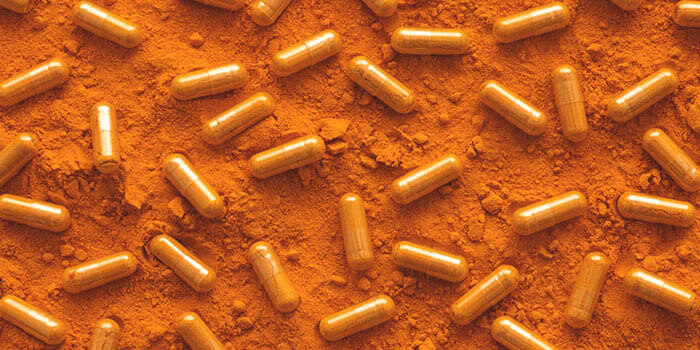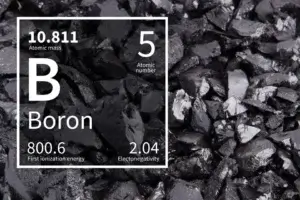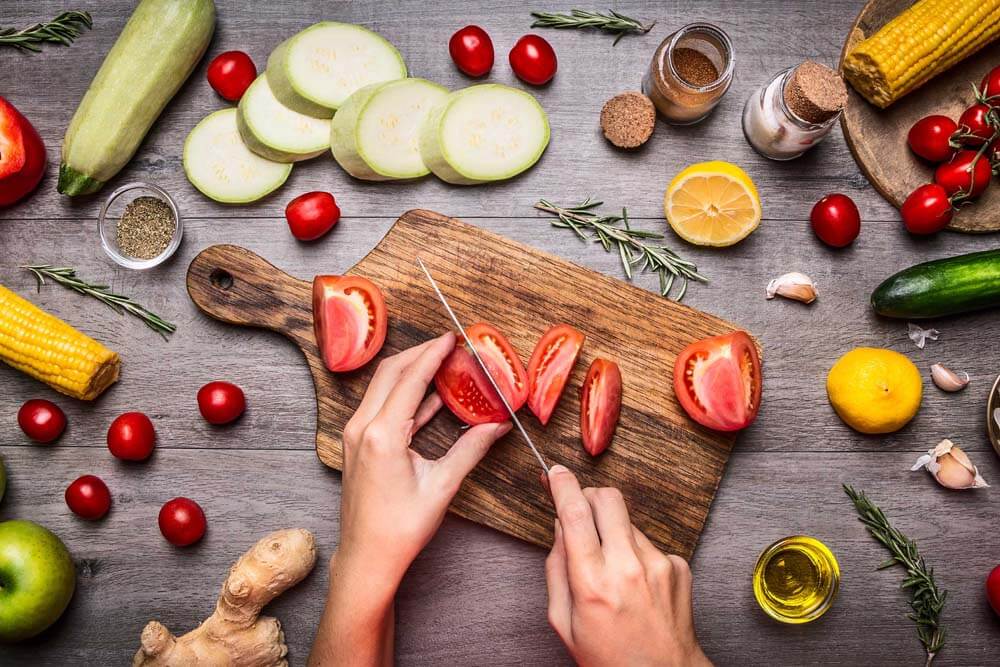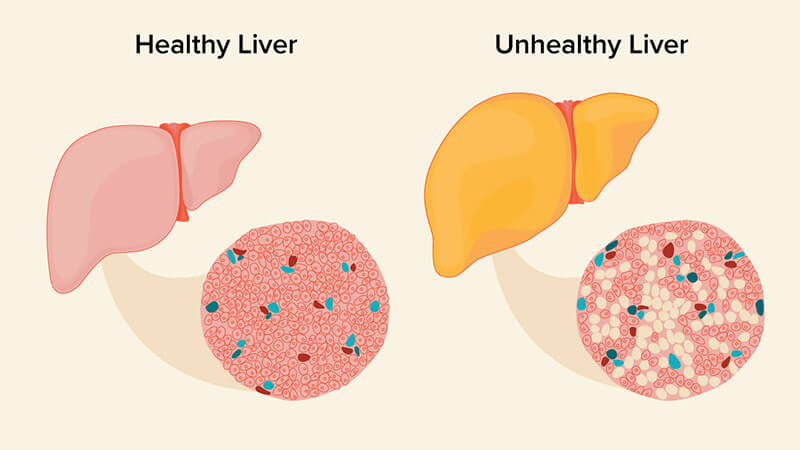What is Turmeric Curcumin?
Turmeric curcumin is a powerful spice derived from the rhizome of a tropical plant called curcuma longa. Curcuma is a three-foot tall plant that grows in India and South Asia with lush leaves 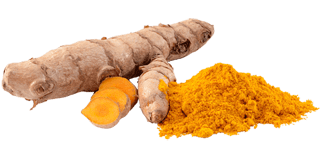 and beautiful flowers. Rhizomes are thickened storage areas along the roots that contain starches, proteins and other nutrients for the plant. These underground stems grow below the plant and horizontally against gravity, sending up new shoots.
and beautiful flowers. Rhizomes are thickened storage areas along the roots that contain starches, proteins and other nutrients for the plant. These underground stems grow below the plant and horizontally against gravity, sending up new shoots.
Origin of Turmeric Curcumin
Turmeric is a powerful spice often used in Indian curry and is known as the golden spice of India, where 90 percent of it is grown. It is believed turmeric began its culinary and medicinal journey with the Harappan Civilization of the Indus Valley in the shadow of the Himalayas. Turmeric’s striking yellow pigment contains curcumin, one of the most potent anti-inflammatory chemical compounds found on the planet. For those seeking powerful relief from inflammation who wish to avoid the side effects of pharmaceuticals, turmeric curcumin is one of Earth’s natural healing foods.
What is the medical value of turmeric curcumin?
Scientific research has recently discovered that the underlying mechanism of many serious diseases such as arthritis, asthma and vascular diseases is inflammation. Other deadly inflammatory maladies include coronary artery disease and high blood pressure. It is becoming more apparent that Alzheimer’s disease and even cancer may all be responses to inflammation 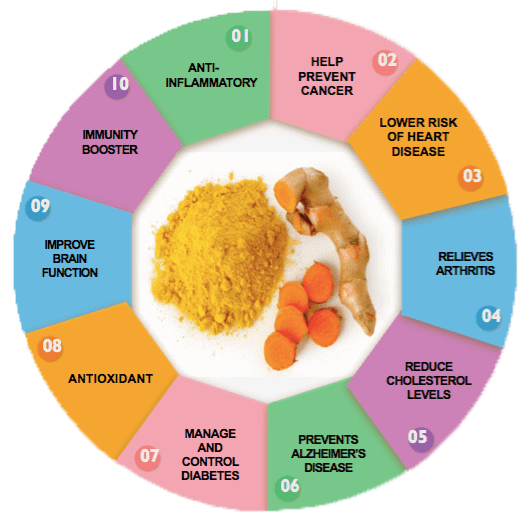 in the body. Turmeric curcumin interferes with many molecular pathways, including inflammatory cytokines.
in the body. Turmeric curcumin interferes with many molecular pathways, including inflammatory cytokines.
Turmeric curcumin for medicinal properties
Turmeric curcumin has been used for medicinal qualities for over 4,500 years. It is a potent anti-inflammatory and anti-oxidant capable of interfering with the body’s inflammatory pathways, thus inhibiting inflammation. When taken with both fat and piperine, the biological relief is equivalent to pharmaceuticals such as NSAIDs (non-steroidal anti-inflammatory drugs) with far fewer side effects and at a fraction of the cost.
There are over 200 active ingredients in turmeric and more than 100 compounds have been identified, including volatile oils, polysaccharides and aromatic components such as turmerone, arturmerone, and zingiberene. The best-known healing agents in turmeric are curcuminoids, of which the preeminent is curcumin.
Turmeric curcumin Spice and nutritional values
In addition to valuable medicinal properties, the spice turmeric curcumin contains beneficial nutritional constituents including potassium, manganese, iron, vitamin C, magnesium, and vitamin B6. It is also a good source of dietary fiber.
Inflammatory response and environmental toxins
The human body has a number of approaches to managing foreign invaders. The basic response following the introduction of a foreign pathogen is the arrival of macrophage cells. These cells orchestrate the release of chemicals including cytokines, bradykinins, and histamine. These chemicals in turn initiate a reaction that causes swelling in an effort to localize and stop the spread of toxins or pathogens. Many of today’s environmental pollutants cause this inflammatory reaction.
Westernized diets and Inflammation
Beyond environmental toxins and pathogens, westernized diets contribute to inflammation through many commonplace foods, including pasteurized dairy products, corn and soybean oils, as well as sugars and refined carbohydrates. Being overweight also contributes to inflammation due to excess fatty acids in the blood, which trigger the immune system to increase inflammation.
Most effective way of taking turmeric curcumin

Turmeric curcumin is a fat-soluble spice, which means the body absorbs it only in the presence of fat. If you are drinking plain tea with turmeric powder, much of the turmeric passes through the body. The bioavailability of turmeric is additionally increased by taking it with piperine, the active ingredient in black pepper. Supplements with black pepper significantly increase absorption and by some estimates, the amount available is 1,000 times greater when taken with black pepper. Taking turmeric curcumin with fat-based compounds allows for maximum absorption and utilization. An often-used recipe called Golden Milk utilizes milk, ground turmeric, black pepper, and coconut oil.
Turmeric Curcumin’s cultural history
Since ancient times, turmeric has been used as a dye and is still used to dye the robes of monks. Sacred rituals utilize turmeric, which is considered advantageous in courting both fertility and good fortune. People in southern India wear dried turmeric, as it is believed to bring good luck and to protect from evil.
Turmeric’s surprising list of Benefits
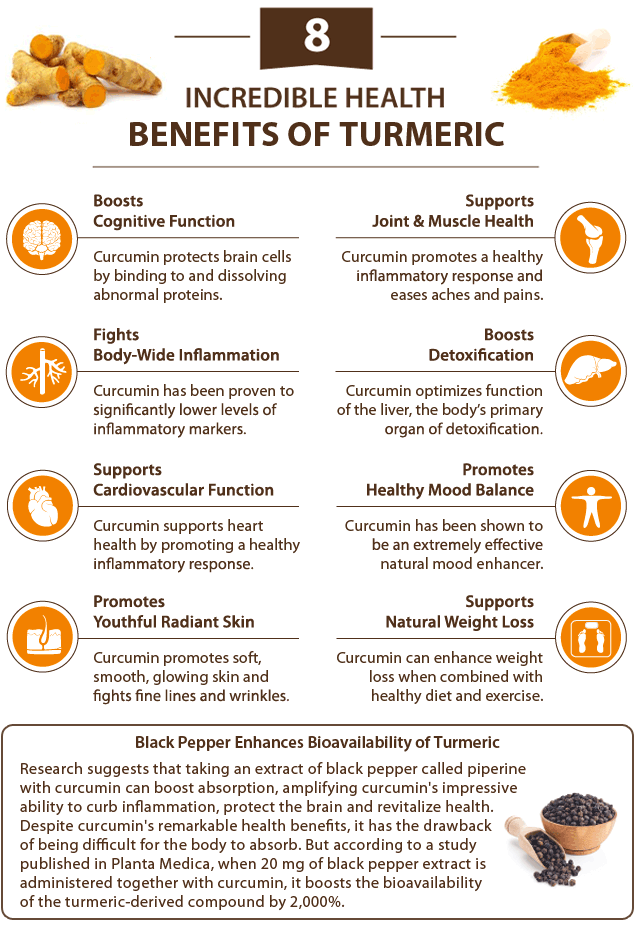
Over 700 clinical studies have been performed on turmeric, making it one of the most studied plants on earth. The studies have declared these benefits of turmeric:
- Turmeric can successfully diminish depression and some studies have shown it to be as helpful as Prozac.
- Turmeric works as an antiseptic and antibiotic on wounds.
- It’s an effective and powerful agent in both preventing and treating cancer.
- Turmeric balances blood sugars in the treatment of diabetes.
- It’s extremely effective at lowering blood pressure.
- It works as a powerful anti-inflammatory agent in the treatment of arthritis.
- It reduces amyloid plague in those suffering from both dementia and Alzheimer’s disease.
- Turmeric strengthens the immune system.
- It’s effective in the treatment of skin conditions.
- It is synergistic, or enhances the effects of other medicines.
- Turmeric shortens the length of viral infections.
- It improves liver function by increasing levels of glutathione in the liver.
Methods of ingestion of turmeric curcumin
The rhizome of turmeric is harvested, boiled, and then ground as a spice and used in many culinary dishes. Turmeric can also be purchased at the grocery store, then finely chopped and added to a variety of delightful dishes. The active ingredient, curcumin is also available in supplement form.
Best choices in turmeric curcumin supplements
Supplements containing whole turmeric with curcumin are the best choices for supplements, as turmeric contains additional active compounds found within the rhizome. Curcumin supplements are limited to only one chemical compound. Look for supplements containing piperine or black pepper as the bioavailability is vastly improved.
Turmeric curcumin Cautionary Advice
Pregnant women or those with gallstones or problems with their bile ducts should not take turmeric curcumin. Do not combine with any prescription drugs or non-prescription drugs without the consultation of a doctor, as elimination of these drugs may be slowed especially in the presence of piperine. In combination with chemotherapy, curcumin can impair the effectiveness of treatment. As with all supplements, be aware of drug interactions with both prescribed and over-the-counter medications.



